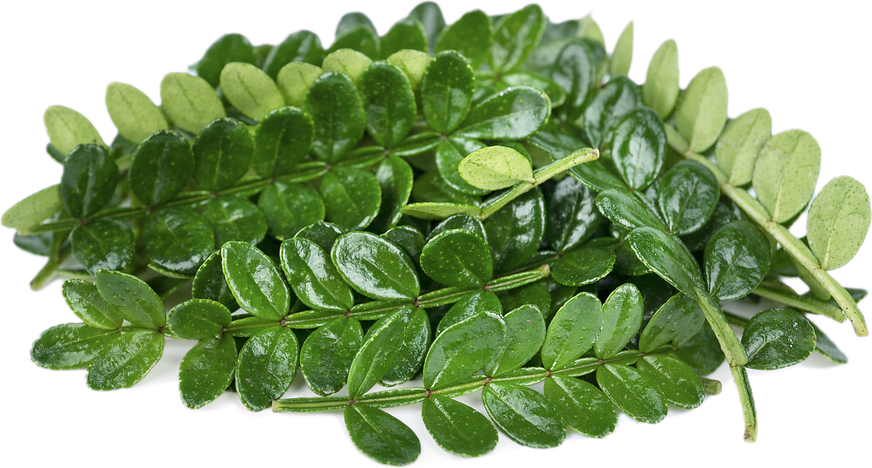


Kinome Leaf
Estimated Inventory, 50 ct : 19.00
This item was last sold on : 07/02/25
| Fresh Origins | Homepage |
Description/Taste
Kinome leaves are small to medium in size, measuring 12 to 15 centimeters in length, and are comprised of round to ovate-shaped leaves spaced opposite each other along a thin, woody stem. The leaves are smooth and waxy with a dark green color, deep central veining, and lightly serrated edging. The underside of the leaves is lime green with dark freckles and a smooth, matte finish, and the leaves have a tender and succulent texture. Kinome leaves have a bright and citrusy aroma and an intense flavor with yuzu, grapefruit, and mint notes, followed by a mild numbing sensation that activates the salvatory glands and creates a buzzing sensation on the palette.
Seasons/Availability
Kinome leaves are available year-round.
Current Facts
Kinome leaves are the small, young leaves of the sansho or prickly ash tree, a Japanese fruit tree in the citrus family botanically classified as Zanthoxylum piperitum. The name Kinome is derived from the Japanese words “ki,” meaning “tree,” and “me,” meaning “bud.” The fruits of the prickly ash tree, known as sansho peppers, are also used in Japanese cuisine. There is a common misconception that the sansho peppercorn and the szechuan peppercorn are the same fruit and can be used interchangeably, however, this is not true. Szechuan peppercorns have intense heat and lack the bright citrus notes of sansho peppers. They do, however, share the numbing sensation known as sanchool, which confuses the nerves of the tongue and mouth, resulting in a tingling feeling on the palette. Kinome leaves are a part of a boutique line of specialty greens developed by Fresh Origins Farm in San Marcos, California, grown year-round and in-house in sprawling, sustainably-minded greenhouses. Kinome leaves are designed to enhance the visual and textural experience of a variety of sweet, savory, and beverage recipes.
Nutritional Value
Kinome leaves are a significant source of vitamin A, an essential vitamin that supports eye health, cell growth, and the body’s immune system. The leaves also contain moderate amounts of B vitamins that can reduce the risk of heart disease and anemia, calcium to maintain strong bones, and manganese, a mineral that helps the body form connective tissues, bones, and hormones.
Applications
Kinome leaves are delicate with a mild flavor and unique effervescent quality that lends itself to a variety of culinary applications. The leaves can be used to garnish a plate to enhance the flavors already present, or they can be muddled in a cocktail to create a unique drink. They can be blended into a sauce used during plating or mixed into a vinaigrette and drizzled over a salad. The leaves can be used to enhance soups, curries, and miso, added to sushi and spring rolls, or mixed into sugars, salts, or oils and used to accent sweet and spicy flavors, or they can be used to garnish desserts like ice cream, cake, or sorbet to create a unique culinary experience. It is recommended to start with smaller amounts and gradually add more to develop a sensory dish. Kinome leaves pair well with citruses such as yuzu, sudachi, lemons, grapefruit, limes, and oranges, honey, agave, ginger, mango, cucumbers, seafood, poultry, and springtime vegetables including peas, fava beans, and green garlic. The leaves will generally keep up to seven days when stored unwashed, dry, and in a container in the refrigerator. It is recommended to use Kinome leaves immediately for the best quality and flavor.
Ethnic/Cultural Info
In Japan, the art of garnishing is known as yakumi, meaning “medicine flavor,” a natural condiment used as food seasoning. Traditionally, these garnishes were not only meant to enhance the flavor of a dish but also to sanitize food and help prevent food poisoning or to help mute certain smells. These herbs, spices, and vegetables play an important role in Japanese cuisine, enhancing the aroma, flavor, and texture of many different Japanese dishes, including miso, noodles, sushi, and sashimi. Popular yakumi garnishes include wasabi, shiso, and yuzu, but a revered springtime yakumi is young Kinome leaves. During preparation, the leaves are clapped between the hands to release their oils and enhance their flavor. They are often ground up and added to miso, served on the side of sushi or sashimi, placed atop grilled fish, or muddled in cocktails featuring fresh citrus flavors and Japanese spirits.
Geography/History
Japanese sansho is native to most of Japan, southern parts of the Korean peninsula, and the Chinese mainland. Sansho pepper fruits have been used as food and for medicinal purposes in these regions since ancient times, with evidence of their use dating back to the Jomon Period in 10,000 BCE. Large-scale sansho farming began in Japan in the Meiji era, spanning from 1868 to 1912. Kinome leaves are grown at Fresh Origins, a farm located in San Marcos, California, the leading producer of naturally grown microgreens since the mid-1990s. Fresh Origins also has the highest level third-party-audited food safety program and is a certified member of the California Leafy Greens Marketing Agreement, which follows science-based food safety practices to promote transparency and honesty in production. The temperate climate of southern California allows Fresh Origins to produce their high-quality greens year-round, supplying produce suppliers and chefs directly throughout the United States and Canada.
Featured Restaurants
Restaurants currently purchasing this product as an ingredient for their menu.
| The Taco Stand | San Diego CA | 619-549-9919 |
| Ju-Ichi | San Diego CA | 619-800-2203 |
| Donation 3 | San Diego | 619-295-3172 |
| Under Belly-Uptown (Bar) | San Diego CA | 619-269-4626 |
| Fifty Two Remedies Bar | San Diego CA | 858-707-7016 |
| Park Hyatt Aviara | Carlsbad CA | 760-448-1234 |
| Lilo | Carlsbad CA | 619-385-0914 |
| Sushi Gaga | San Diego CA | 619-808-1556 |
| Captains Quarters | San Diego CA | 858-412-5237 |
| Matsu | Oceanside CA | 760-717-5899 |
| Wormwood | San Diego CA | 619-573-0289 |
| Estancia Adobe | San Diego CA | 858-550-1000 |
| Azuki Sushi Lounge | San Diego CA | 619-238-4760 |
| Under Belly-Little Italy Bar | San Diego CA | 619-269-4626 |
| Madison | San Diego CA | 619-822-3465 |
| Herb & Wood Bar | San Diego CA | 619-955-8495 |
| Polite Provisions | San Diego CA | 619-677-3784 |
| Kingfisher | San Diego CA | 619-861-8074 |
| Moniker Cocktail Co. | San Diego CA | 858-337-9716 |
| Campfire Bar | Carlsbad CA | 858-231-0862 |
| Jeune Et Jolie | Carlsbad CA | 858-231-0862 |
| Paradise Point Resort Tidal | San Diego CA | 858-490-6363 |
Recipe Ideas
Recipes that include Kinome Leaf. One
| No Spoon Neccessary |
|
Beer Braised Baja Chicken Tacos |




 Learn More...
Learn More...
